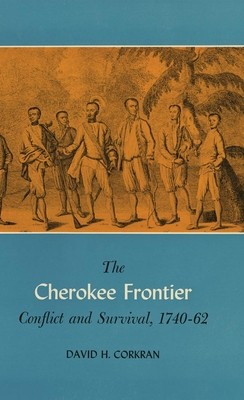
- We will send in 10–14 business days.
- Author: David H Corkran
- Publisher: University of Oklahoma Press
- ISBN-10: 0806152834
- ISBN-13: 9780806152837
- Format: 15.2 x 22.9 x 1.9 cm, softcover
- Language: English
- SAVE -10% with code: EXTRA
Reviews
Description
American Indians have talent in both oratory and statesmanship. American history provides abundant examples of Indians' adroit political maneuvering with the whites. Less well known are the maneuvers that took place within individual tribes.
The Cherokee Indians are celebrated for their political and social achievements. But the fact that the Cherokee concept of nationalism was formulated long before the nineteenth century has been overlooked. From 1740 until 1762 the Cherokees lived in the area of present-day North Carolina, South Carolina, Georgia, and Virginia, and they were a homogeneous people, albeit struggling in the face of opposition within and without. During this critical period the traditional nationalist forces in the nation had to contend with many brands of factionalism. The traditional leadership, stemming from Overhill Chota, came into conflict with the English puppet leadership at Overhill Great Tellico, and French-English rivalry split the nation into two forces. One, led by Old Hop, the first Beloved Man of the nation, advocated neutrality. The other, led by Attakullaculla, favored the English alliance. After a cruel war with the English, in which two royal expeditionary forces laid waste the Cherokee country, Attakullaculla was able to bring about a peace. This realistic picture of Indian intrigue reveals the influence of intratribal conflict on colonial history--demonstrating that the Cherokees' own problems were more significant than European pressure in shaping events. The story of Cherokee statesmanship in terms of Indian institutions provides fresh insight into this era of colonial and American Indian history.EXTRA 10 % discount with code: EXTRA
The promotion ends in 17d.02:14:17
The discount code is valid when purchasing from 10 €. Discounts do not stack.
- Author: David H Corkran
- Publisher: University of Oklahoma Press
- ISBN-10: 0806152834
- ISBN-13: 9780806152837
- Format: 15.2 x 22.9 x 1.9 cm, softcover
- Language: English English
American Indians have talent in both oratory and statesmanship. American history provides abundant examples of Indians' adroit political maneuvering with the whites. Less well known are the maneuvers that took place within individual tribes.
The Cherokee Indians are celebrated for their political and social achievements. But the fact that the Cherokee concept of nationalism was formulated long before the nineteenth century has been overlooked. From 1740 until 1762 the Cherokees lived in the area of present-day North Carolina, South Carolina, Georgia, and Virginia, and they were a homogeneous people, albeit struggling in the face of opposition within and without. During this critical period the traditional nationalist forces in the nation had to contend with many brands of factionalism. The traditional leadership, stemming from Overhill Chota, came into conflict with the English puppet leadership at Overhill Great Tellico, and French-English rivalry split the nation into two forces. One, led by Old Hop, the first Beloved Man of the nation, advocated neutrality. The other, led by Attakullaculla, favored the English alliance. After a cruel war with the English, in which two royal expeditionary forces laid waste the Cherokee country, Attakullaculla was able to bring about a peace. This realistic picture of Indian intrigue reveals the influence of intratribal conflict on colonial history--demonstrating that the Cherokees' own problems were more significant than European pressure in shaping events. The story of Cherokee statesmanship in terms of Indian institutions provides fresh insight into this era of colonial and American Indian history.

Reviews